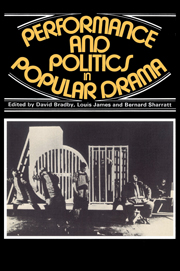 Performance and Politics in Popular Drama
Performance and Politics in Popular Drama Published online by Cambridge University Press: 08 March 2010
Erwin Piscator would probably have disliked the term ‘popular theatre’ – at least in its most obvious German version, ‘Volksdrama’ or ‘Volkstheater’. As a director whose ambition was to create a revolutionary, class-conscious theatre which aimed at ‘agitation with scenic means’, these expressions would have had an innocuous and anachronistic ring. The Berlin Volksbuhne, for instance, founded in 1890 to bring serious drama within the reach of the working masses, had ceased by the 1920s to reflect their political and social interests and, as Piscator put it, ‘had lost its last vestige of aggressiveness and been swallowed up and absorbed into the sphere of the bourgeois theatre’. Piscator's own early experiments led him to realise that any hope of building up a truly proletarian theatre movement was not possible in a society devoid of the necessary political and economic prerequisites. After some half dozen productions mounted between 1920 and 1921 in various assembly halls and workers' pubs in Berlin, he was forced to develop his ideas within the framework of the conventional theatre, including the Volksbuhne about which he had been so disparging. Three politically tendentious productions there between 1924 and 1927 led to a clash with the management who objected to the word ‘Volk’ in the name of their institution being equated with the ‘radical working classes’. Piscator was obliged to look around for an alternative home for his dramaturgical ideas and, thanks to the wealthy connections of the actress Tilla Durieux, was able to take over the Theater am Nollendorfplatz.
To save this book to your Kindle, first ensure no-reply@cambridge.org is added to your Approved Personal Document E-mail List under your Personal Document Settings on the Manage Your Content and Devices page of your Amazon account. Then enter the ‘name’ part of your Kindle email address below. Find out more about saving to your Kindle.
Note you can select to save to either the @free.kindle.com or @kindle.com variations. ‘@free.kindle.com’ emails are free but can only be saved to your device when it is connected to wi-fi. ‘@kindle.com’ emails can be delivered even when you are not connected to wi-fi, but note that service fees apply.
Find out more about the Kindle Personal Document Service.
To save content items to your account, please confirm that you agree to abide by our usage policies. If this is the first time you use this feature, you will be asked to authorise Cambridge Core to connect with your account. Find out more about saving content to Dropbox.
To save content items to your account, please confirm that you agree to abide by our usage policies. If this is the first time you use this feature, you will be asked to authorise Cambridge Core to connect with your account. Find out more about saving content to Google Drive.